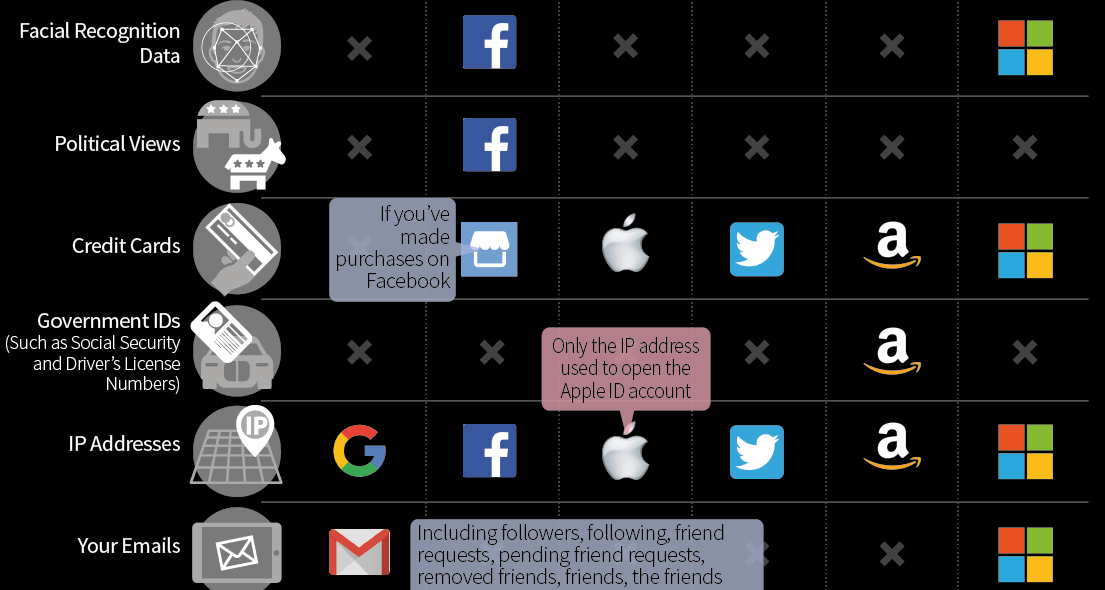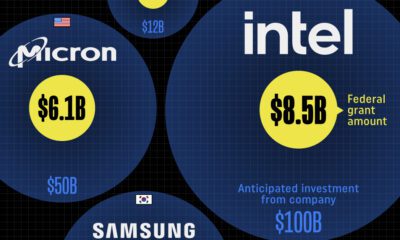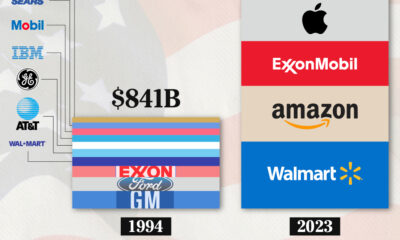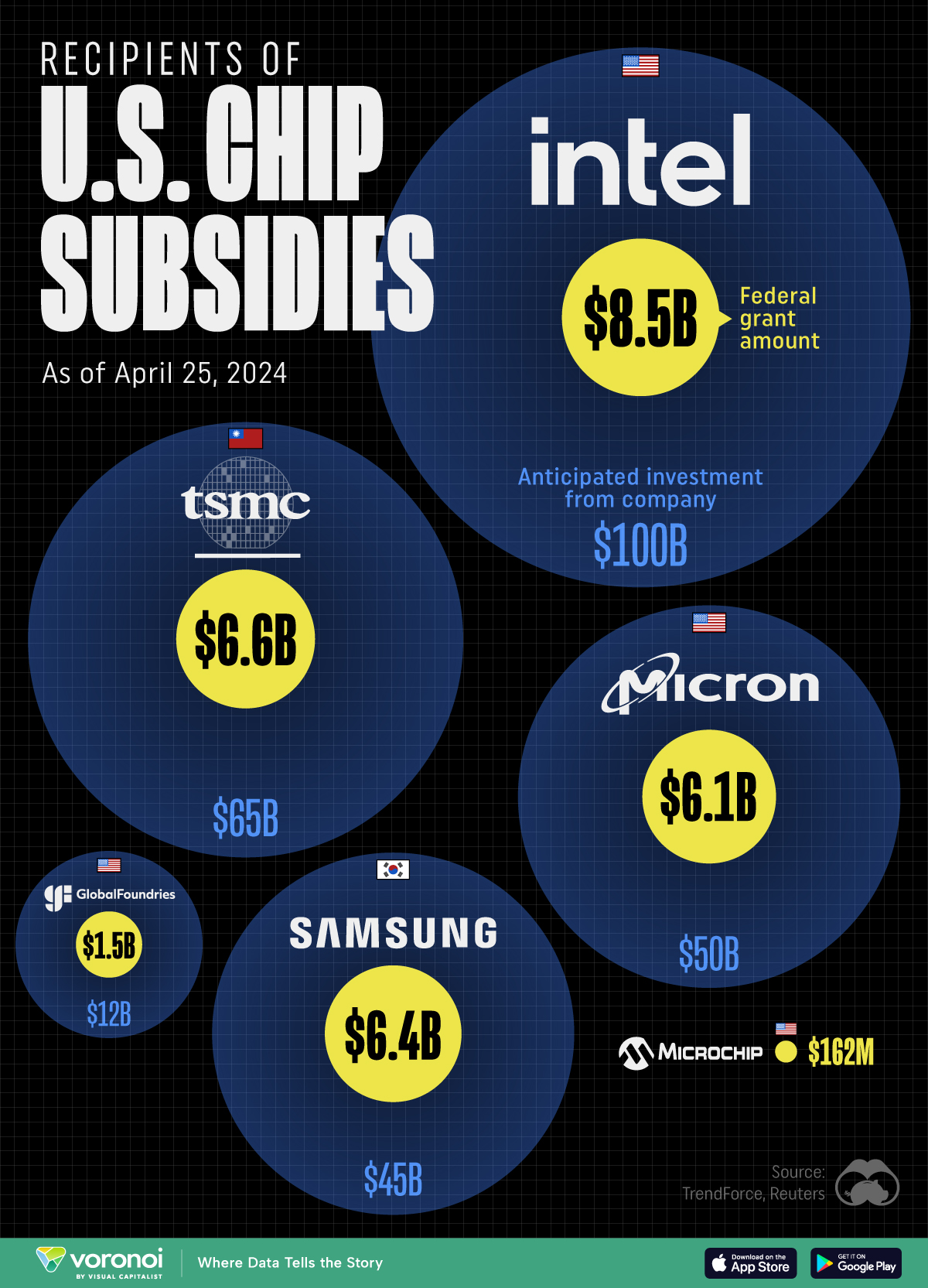Technology
Here’s What the Big Tech Companies Know About You
The novelty of the internet platform boom has mostly worn off.
Now that companies like Facebook, Amazon, and Alphabet are among the world’s most valued companies, people are starting to hold them more accountable for the impact of their actions on the real world.
From the Cambridge Analytica scandal to the transparency of Apple’s supply chain, it’s clear that big tech companies are under higher scrutiny. Unsurprisingly, much of this concern stems around one key currency that tech companies leverage for their own profitability: personal data.
What Big Tech Knows
Today’s infographic comes to us from Security Baron, and it compares and contrasts the data that big tech companies admit to collecting in their privacy policies.

While the list of data collected by big tech is extensive in both length and breadth, it does take two to tango.
For many of these categories, users have to willingly supply their data in order for it to be collected. For example, you don’t have to fill out your relationship status on Facebook, but millions of users choose to do so.
Did I Opt Into This?
The majority of the data categories on the list make sense – it’s a no-brainer that Amazon has your credit card information, or that Google knows what websites you visit. Even the least tech-savvy person would likely understand this.
However, there are definitely some categories of data that get collected and stored that may sound unnerving to some people:
- Facebook knows your political views, religious views, and even your ethnicity
- Xbox users will have their skeletal tracking data collected through the Kinect device
- Facebook also knows your income level, which it finds out through partnerships with personal data brokers
- Platforms collect your documents, email, and message data – though some of this is just metadata
- Facebook and Microsoft store facial recognition data, based on the pictures you upload
Remember, this is just what companies admit to collecting in their privacy policies – what else do you think they know?
Technology
All of the Grants Given by the U.S. CHIPS Act
Intel, TSMC, and more have received billions in subsidies from the U.S. CHIPS Act in 2024.
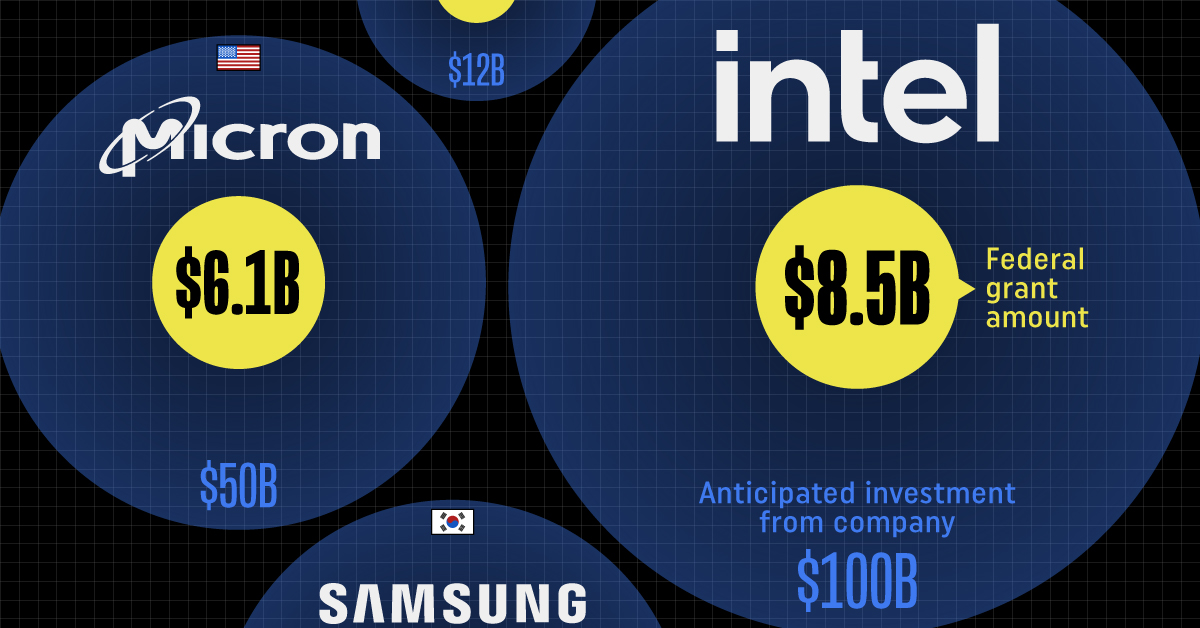
All of the Grants Given by the U.S. CHIPS Act
This was originally posted on our Voronoi app. Download the app for free on iOS or Android and discover incredible data-driven charts from a variety of trusted sources.
This visualization shows which companies are receiving grants from the U.S. CHIPS Act, as of April 25, 2024. The CHIPS Act is a federal statute signed into law by President Joe Biden that authorizes $280 billion in new funding to boost domestic research and manufacturing of semiconductors.
The grant amounts visualized in this graphic are intended to accelerate the production of semiconductor fabrication plants (fabs) across the United States.
Data and Company Highlights
The figures we used to create this graphic were collected from a variety of public news sources. The Semiconductor Industry Association (SIA) also maintains a tracker for CHIPS Act recipients, though at the time of writing it does not have the latest details for Micron.
| Company | Federal Grant Amount | Anticipated Investment From Company |
|---|---|---|
| 🇺🇸 Intel | $8,500,000,000 | $100,000,000,000 |
| 🇹🇼 TSMC | $6,600,000,000 | $65,000,000,000 |
| 🇰🇷 Samsung | $6,400,000,000 | $45,000,000,000 |
| 🇺🇸 Micron | $6,100,000,000 | $50,000,000,000 |
| 🇺🇸 GlobalFoundries | $1,500,000,000 | $12,000,000,000 |
| 🇺🇸 Microchip | $162,000,000 | N/A |
| 🇬🇧 BAE Systems | $35,000,000 | N/A |
BAE Systems was not included in the graphic due to size limitations
Intel’s Massive Plans
Intel is receiving the largest share of the pie, with $8.5 billion in grants (plus an additional $11 billion in government loans). This grant accounts for 22% of the CHIPS Act’s total subsidies for chip production.
From Intel’s side, the company is expected to invest $100 billion to construct new fabs in Arizona and Ohio, while modernizing and/or expanding existing fabs in Oregon and New Mexico. Intel could also claim another $25 billion in credits through the U.S. Treasury Department’s Investment Tax Credit.
TSMC Expands its U.S. Presence
TSMC, the world’s largest semiconductor foundry company, is receiving a hefty $6.6 billion to construct a new chip plant with three fabs in Arizona. The Taiwanese chipmaker is expected to invest $65 billion into the project.
The plant’s first fab will be up and running in the first half of 2025, leveraging 4 nm (nanometer) technology. According to TrendForce, the other fabs will produce chips on more advanced 3 nm and 2 nm processes.
The Latest Grant Goes to Micron
Micron, the only U.S.-based manufacturer of memory chips, is set to receive $6.1 billion in grants to support its plans of investing $50 billion through 2030. This investment will be used to construct new fabs in Idaho and New York.
-
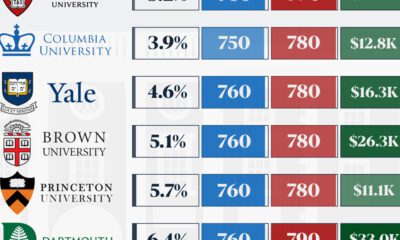
 Education1 week ago
Education1 week agoHow Hard Is It to Get Into an Ivy League School?
-

 Technology2 weeks ago
Technology2 weeks agoRanked: Semiconductor Companies by Industry Revenue Share
-

 Markets2 weeks ago
Markets2 weeks agoRanked: The World’s Top Flight Routes, by Revenue
-

 Demographics2 weeks ago
Demographics2 weeks agoPopulation Projections: The World’s 6 Largest Countries in 2075
-

 Markets2 weeks ago
Markets2 weeks agoThe Top 10 States by Real GDP Growth in 2023
-

 Demographics2 weeks ago
Demographics2 weeks agoThe Smallest Gender Wage Gaps in OECD Countries
-

 Economy2 weeks ago
Economy2 weeks agoWhere U.S. Inflation Hit the Hardest in March 2024
-

 Green2 weeks ago
Green2 weeks agoTop Countries By Forest Growth Since 2001
